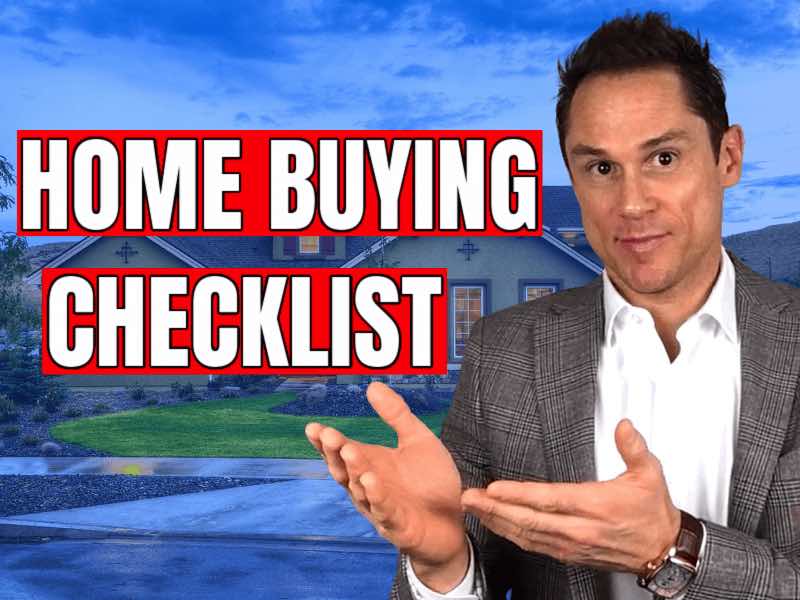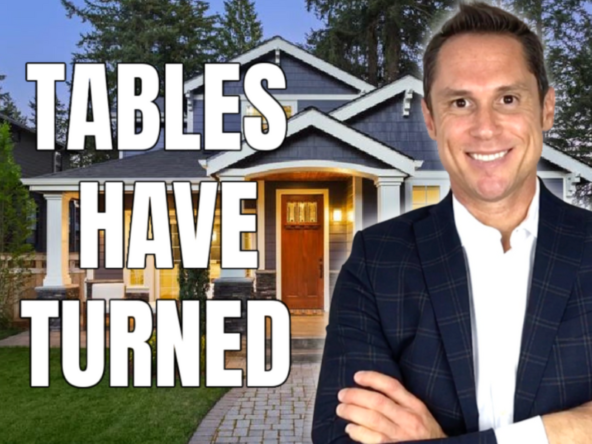Buying your first home can be very exciting and overwhelming at the same time. People always say “buying a home is the single most important financial decision you’ll ever make”. For most people that is true! You want to make sure you have all your ducks in a row and know what to expect when buying. There are multiple things you need to do before you actually start looking at homes or make an offer. With that said, this checklist for buying your first home will put you on the path to a successful purchase.
1. Start Saving for a Down Payment
Considering the prices of homes these days it might take some time. They say “the best time to plant a tree was 20 years ago. The second best time is when? Now!”
You might not need a big down payment. There are several mortgage programs, some of which allow you to put as little as 3% down.
If the interest rates are low you want to put as little down as possible because the cost of borrowing money is cheap. If you don’t have 20% down you’ll have private mortgage insurance (PMI), but it not the end of the world. You can have PMI removed later on.
2. Decide On A Reasonable Budget
A lot of people max out their budget and buy homes they can’t afford only to regret it later. This is something you definitely don’t want to do when buying a house. Just because a lender will give you a loan doesn’t actually mean you can afford to make the payment.
You can get approved for a loan with a monthly payment that’s way more than you’re comfortable spending. In fact, there are plenty of home buyers that have mortgaged themselves to the hilt only to discover later on they’ve become slaves to their home.
Unless you want to live a life of stress, fear, and worry don’t get too crazy here. Lean on the side of being conservative and get a loan that you can comfortably afford to repay.
3. Find A Real Estate Agent
You don’t have to use a real estate agent, but that doesn’t mean you shouldn’t for several reasons. One of the main reasons is a real estate agent is free to the buyer. A buyer’s agent’s commission is paid by the seller of the home.
A good real estate agent will be knowledgeable about your local market and all of the contracts and disclosures. In addition, they’ll negotiate on your behalf and handle other time-consuming parts of the home buying process for you. Essentially, they’ll ensure your home buying experience doesn’t turn into a full-time job or a nightmare.
There is no shortage of real estate agents in the marketplace. It seems like there’s a real estate agent in every family these days so it shouldn’t be too hard to find one.
Most people find an agent through a friend. Ask for recommendations from your friends, family, and colleagues that have actually worked with someone and had a good experience.
You might be tempted to hire your friend’s mom who sells homes as a hobby, but it’s not recommended. Work with a full-time agent that knows what they’re doing as there are endless things that can go wrong. It’s imperative to minimize as much risk as possible.
Be advised not to make the mistake of going directly to the listing agent of a home you like. The main purpose of having a buyer’s agent is for their ability to counsel, protect, and advise you. If you work with an agent that represents both you and the seller you may get advice that might not be in your best interest. A listing agent’s fiduciary duty and loyalty lie with the seller.
4. Get A Pre-Approval To Determine Your Buying Power
You want to get pre-approved for a ballpark amount you’re looking to buy a home for. This is a must. Do this before you start looking at homes so you can determine how much you can buy. There’s no sense in finding and falling in love with a home only to find out you don’t qualify for the loan.
It’s common for homebuyers to get confused by the difference between a pre-qualification and a pre-approval. Getting pre-qualified can be done by giving a lender basic information. However, it’s pretty much worthless when you really want to buy a home.
One of the first things sellers and their agents are going to want to know is if you’re pre-approved. They don’t want to take their home off the market for 3 weeks and discover they’re in escrow with someone that can’t get approved for a home mortgage.
Getting a pre-approval letter requires going through most of the process of getting an actual mortgage. However, unlike pre-qualifying for a loan, lenders will verify your income, employment, your assets, and check your credit.
A pre-approval letter isn’t a 100% guarantee you’re approved, but it’s the closest you can get. Essentially, you’re highly likely to get the mortgage as long as nothing changes with your finances or credit report.
Your real estate agent should have established relationships with competent, local lenders that can get you pre-approved for a mortgage.
5. Find A Home
Make a list of what you must have such as the number of bedrooms and bathrooms. Maybe you must have a single-story home or be in a neighborhood that pertains to a certain school district. They say the perfect house doesn’t exist, but you might want to list things you’d prefer, but aren’t deal-breakers. For example, maybe that’s a home office, a pool, or being in a cul-de-sac.
Your real estate agent can send you a list of potential properties based on your preferences. Most people search online on their own on one, or a few, of the many real estate websites out there.
Everybody says real estate is all about “location, location, location”. The reason for that is you’re not just buying the house, you’re buying the entire neighborhood. When you find a home online you think you like, make sure you drive through the neighborhood a few times. Not just during the day, but drive by at night to get a good feel for the neighborhood. If you have the opportunity to interact with the neighbors do so and find out how they like living there. Sometimes you’ll get important intel that will confirm you’re making the right choice or even the wrong choice.
Once you’ve vetted a few homes in neighborhoods you like, your agent can then schedule showings for you.
According to the National Association of Realtors, buyers typically search for 10 weeks and look at an average of 10 homes to purchase a home.
That’s the average, you could very easily end up buying the first home you see. We recommend looking at multiple options. As they say, you don’t know how good something is until you have something else to compare it to.
6. Submit An Offer
Once you’re sold on a home your agent will help you prepare your offer. This will include determining the price you’re going to offer, establishing contingencies, getting disclosures, and setting a closing timeline. To prevent losing the house you want, submit your offer as fast as you can. There might be other buyers interested in the same home and if they beat you to it, you’ll miss out.
It’s important to make a strong offer you’re proud of. When buyers lose a house to someone else, it’s common for them to say they would have paid $10K more for the home. If that’s the case, offer the extra $10K upfront. The difference in your payment is only $40-50 per month.
7. Get A Home Inspection
You don’t have to get an inspection, but you definitely want to. A home inspection will help you identify any problems with the home and determine whether they need to be fixed. You don’t want to move into a home and discover the AC or heater doesn’t work, it has a faulty water heater, or the electrical system isn’t up to code and is unsafe.
A home inspector will check all those things and give you a formal home inspection report detailing all the potential issues. The main things you want to be concerned with are significant electrical defects, major plumbing problems, or a broken heater. Not to mention, major structural issues, wood-destroying insects, or anything that would be unsafe, in general. You can then ask the seller for certain repairs, but don’t get carried away and nit-pick. You’re not buying a new home.
Most sellers will be flexible and agree to make reasonable repairs. This is where hiring a full-time real estate agent will come in handy because they can negotiate this for you.
Your real estate agent should be able to refer you to an inspector they know that does a good job. You want an inspector that isn’t going to make mountains out of molehills. More importantly, you want an inspector that isn’t going to overlook important issues just so the sale closes.
If you don’t know your agent very well or don’t trust him you might want to hire your own inspector. Then again, if you don’t trust your agent you probably shouldn’t be working with them in the first place!
8. Get An Appraisal
An appraisal is an estimate of the value of the home based on comparable sales, also known as “comps”. Comps refer to prices paid for recently sold homes in the area that are comparable in size and style. Other factors that determine the appraised value are the home’s appearance, amenities, and condition.
If you’re getting a mortgage lenders will demand an appraisal be done to protect themselves. The last thing a lender wants is to have the home appraise for less than the accepted purchase price.
They want to make sure they’re only lending based on what the home is worth, and not a penny more. Because if you don’t make your payments they want to know they can sell the property and recuperate their money. The bottom line is lenders want to minimize their risk at all costs.
If the appraisal does come in lower than the purchase price you have the option to renegotiate. The seller will have to lower the price, you’ll have to make up the difference, or a combination of the two.
9. Closing The Sale
The final step is closing the sale. On the day of closing, you’ll sign all the paperwork – it’s a lot – and ownership of the home will be transferred to you.
The 4 most important things you’ll sign are the…
- Settlement Statement – this summarizes the final fees and charges.
- Promissory Note – this is an IOU showing the terms of the loan and the payment dates.
- The Deed – this transfers ownership from the seller to you.
- Mortgage/Deed of Trust – this says you agree to a lien on your home as security of repayment on your home loan.
In conclusion, if you follow this checklist you’ll know exactly what to expect and what to do when you’re buying your first home.
Who else do you know that wants to buy a home within the next 12 months? Share this with them so they’ll be fully prepared as well.
Subscribe to My YouTube Channel for more Real Estate Information and Tips.





